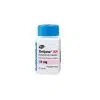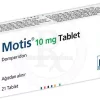No products in the cart.
Return To ShopNo products in the cart.
Return To ShopNexium® (esomeprazole) is used to treat and manage the overproduction of stomach acid.
| Brand | Form | Price | Qty | Action |
|---|---|---|---|---|
| Nexium Brand | 20 mg 28 Tablets | $19.00 | ||
| Nexium Brand | 40 mg 28 Tablets | $40.00 |
Nexium® (esomeprazole) belongs to a group of medications called proton pump studies. It is used in peptic ulcer disease, dyspepsia and Zollinger-Ellison use. In Israel, Nexium® does not come in a capsule, although it is the same as the Nexium® available for purchase in the US. Nexium® is a delayed-release tablet and is usually prescribed with a starting dose of 40 mg once daily. Common side effects include headache, diarrhea, upset stomach, bloating, fullness, nauseousness, dry mouth, and abdominal banding.
This medication contains the substance esomeprazole. It belongs to the group of medicines called proton pump inhibitors. It reduces the amount of acid in your stomach. This medication is used to treat the following diseases: gastroesophageal reflux disease, stomach ulcers or ulcers, Zollinger-Ellison syndrome, and to prevent new bleeding from an ulcer.
The dosage of Nexium depends on the condition being treated and the individual patient. Common adult dosages are:
It is important to take Nexium on an empty stomach with a glass of water. You should not chew or crush the tablets.
The most common Nexium side effects include:
More serious side effects include:
| Brand | Nexium Brand |
|---|---|
| Form | 20 mg 28 Tablets, 40 mg 28 Tablets |
Esomeprazole, like other PPIs, is well-tolerated. The most common side effects are diarrhea, nausea, vomiting, headaches, rash and dizziness. Nervousness, abnormal heartbeat, muscle pain, weakness, leg cramps, and water retention occur infrequently. Headache or abdominal pain may occur. If any of these effects persist or worsen, tell your doctor or pharmacist promptly.Remember that your doctor has prescribed this medication because he or she has judged that the benefit to you is greater than the risk of side effects. Many people using this medication do not have serious side effects.Tell your doctor right away if you have any serious side effects, including: symptoms of a low magnesium blood level (such as unusually fast/slow/irregular heartbeat, persistent muscle spasms, seizures). This medication may rarely cause a severe intestinal condition (Clostridium difficile-associated diarrhea) due to a type of bacteria. Do not use anti-diarrhea products or narcotic pain medications if you have any of the following symptoms because these products may make them worse. Tell your doctor right away if you develop: persistent diarrhea, abdominal or stomach pain/cramping, fever, blood/mucus in your stool.A very serious allergic reaction to this drug is rare. However, get medical help right away if you notice any symptoms of a serious allergic reaction, including: rash, itching/swelling (especially of the face/tongue/throat), severe dizziness, trouble breathing.This is not a complete list of possible side effects. If you notice other effects not listed above, contact your doctor or pharmacist.In the US -Call your doctor for medical advice about side effects.
Esomeprazole is used to treat certain stomach and esophagus problems (such as acid reflux, ulcers). It works by decreasing the amount of acid your stomach makes. It relieves symptoms such as heartburn, difficulty swallowing, and persistent cough. This medication helps heal acid damage to the stomach and esophagus, helps prevent ulcers, and may help prevent cancer of the esophagus. Esomeprazole belongs to a class of drugs known as proton pump inhibitors (PPIs).
What is Nexium used to treat?
It is usually prescribed to be taken once or twice a day. To minimize side-effects symptoms, it should be taken at least one hour before eating or drinking anything that may cause heartburn. Follow the directions of your doctor or pharmacist, or ask them to explain if you encounter unexpected side effects.
Some signs of high stomach acid include abdominal discomfort, especially on an empty stomach; nausea or vomiting; bloating; heartburn; diarrhea; decreased appetite and unexplained weight loss.
Nexium is prescribed for patients with heartburn, indigestion or acid reflux. There have been reports of rare cases where its use caused serious liver damage. Severe injury due to esomeprazole is uncommon, and most cases are resolved promptly upon withdrawal of treatment with Nexium.
Alcohol increases the production of acid in the stomach, which creates the need for heartburn medication. If you already take medications like Nexium to treat heartburn and indigestion, doctors advise steering clear of alcohol.
The content on this page has been supplied to telavivpharma.com by an independent third party contracted to provide information for our website. telavivpharma.com relies on these third parties to create and maintain this information and cannot guarantee the accuracy or reliability of the information that has been provided to us.
The drug information provided here is only a summary and does not contain all the list of possible side effects and drug interactions regarding this medication. Be sure to contact your doctor or pharmacist if you have any specific question or concern. If you require any advice or information about the drugs on this page, a medical condition or treatment advice, you should always speak to a healthcare professional.
Please note that not all products, including any referenced in this page, are shipped by our affiliated Israel Pharmacy. We are affiliated with other dispensaries that ship product to our customers from the following jurisdictions: Canada, New Zealand, Turkey and United Kingdom. The items in your order maybe shipped from any of the above jurisdictions. The products are sourced from various countries as well as those listed above. Rest assured, we only affiliate with our authorized dispensaries that procure product through reliable sources.
Required
Send Your Prescription
Secure Payment
No Hidden Fees
Fast Shipping
Typically Under 7 days
From: $465.00


$14.00


Reviews
There are no reviews yet.